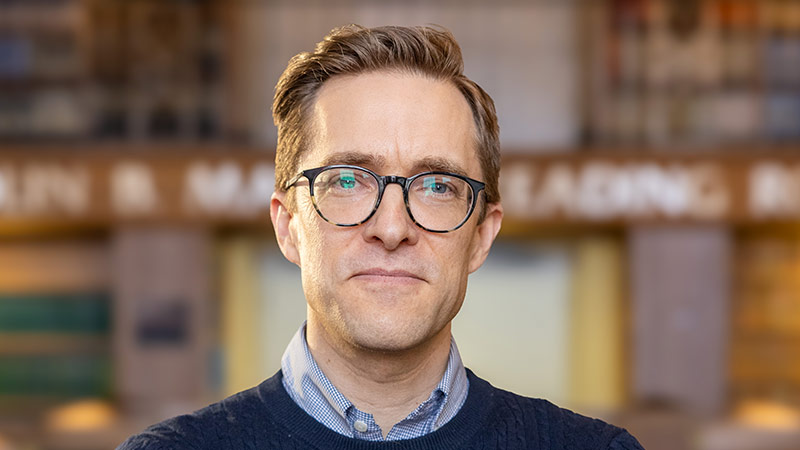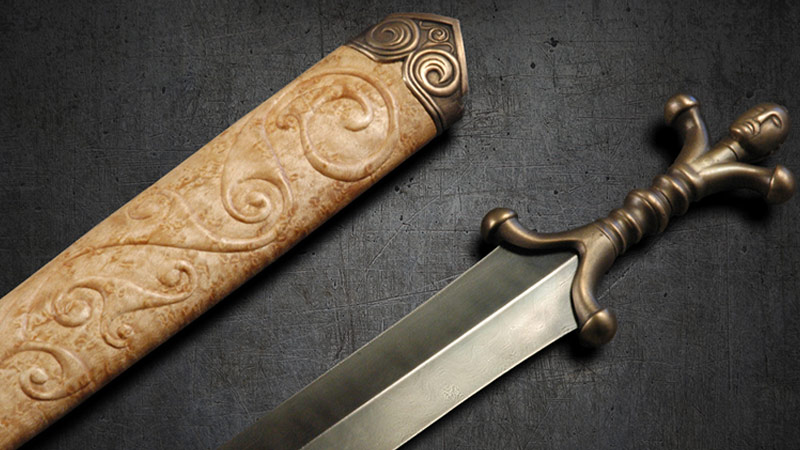Forging a unique path: Jacob Powning's journey from swordsmithing to AI law
Author: Kayla Cormier
Posted on May 29, 2025
Category: UNB Saint John , UNB Fredericton

Jacob Powning, son of author Beth Powning and sculptor Peter Powning, is a world-renowned swordsmith. Three years ago, he put down his carving and forging tools and hit the books at UNB Law, where he studied privacy law and artificial intelligence. His unique story illustrates that it’s never too late to reinvent your path, although artistry and law have more in common than we might think.
In a small forest village nestled in south-central New Brunswick, Jacob Powning (BA'21, MIDST'22, JD’25) grew up surrounded by the magic of creation. Born into a family of artists, his childhood was a tapestry of imagination and craftsmanship.
“I grew up around creators. When I was 10, I began making my own toys. I cast my own Teenage Mutant Nija Turtles out of bronze,” he said.
Powning’s fascination with history and mythology led him to a career in sword making, where he combined meticulous research into ancient civilizations with the art of forging—eventually developing an international clientele and having his work displayed in museums across the globe.

“I got to have this international career where I travelled and did presentations and workshops in Europe, Alaska, and across the United States and Canada,” he said. “My ultimate goal was to have one of my swords in a museum in Europe, and I achieved that.”
Powning’s bronze sword titled “Only in Dark the Light” lives in a permanent collection at the The Deutsches Klingenmuseum (German Blade Museum) in Solingen, Germany.
Alongside his career as a craftsman, Powning’s interest in politics and societal regulation grew. He pursued a bachelor of philosophy from the University of New Brunswick (UNB) and an interdisciplinary master’s in history, literature, and philosophy.
These studies allowed him to explore the connections between language, identity, and more recently, artificial intelligence (AI).
“In my philosophy degree, I looked closely at human identity and how early modern concepts of identity developed around the idea that humans are mechanical creatures,” he said.
Powning noted that despite misconceptions that AI is a modern problem, philosophers have been grappling with questions surrounding AI and identity for centuries. He gave French philosopher René Descartes as an example.
“Philosophy looks at how language informs our understanding of ourselves and the world,” he said. “When AI started convincingly creating human language from mathematical inferences, it created fascinating and frightening questions about identity.”
At UNB Law, Powning found a place where his love of philosophy, writing, research and rhetoric converged, each enriching the other.
Alongside his work with the Legal Innovation Lab, Powning’s research delved into AI’s legal implications, particularly around copyright infringement, privacy, and deepfakes. He explored how AI-generated content can infringe on artists’ work and the potential dangers of deepfakes in undermining digital evidence.
Related: Legal Innovation Lab leading digital transformation of N.B.’s justice system
“I began researching how to assign liability when you have an AI autonomously infringing in copyright law,” he said. “That quickly led into looking at how AI trains and then into questions about privacy.”
His research also extended to ethical implications of deepfakes.
“Deepfakes are videos that have been digitally altered to imitate a person’s likeness, doing or saying something they didn’t do or say. The danger is that these videos could undermine the veracity of digital evidence and create convincing disinformation in courts,” he said.
“The consequences of deepfakes can be catastrophic.”
Despite this, Powning suggested that AI technologies can also be used for good.
“The technology that allows deepfakes are called generative adversarial networks and can be used to do all kinds of useful things, like in science, where the benefits outweigh the costs. There is a lot of value in AI, but we can’t use it as a toy—something that’s not regulated—because it really does have significant epistemological dangers where it can undermine the truth,” he said.
“I think we should treat AI as something that has the potential to be quite dangerous to the functioning of democracies, but not act in a superstitious way towards it, since it’s a technology that we can use to do good.
“Ultimately, we should approach AI from a people-centred perspective.”
After graduation, Powning plans to article with the Crown in New Brunswick, focusing on criminal prosecution and ethical public service law.
“Law is an opportunity to craft arguments, and so I look at it as an extension of my work as an artist and visual storyteller,” he reflected.
“It’s just a different medium, and it benefits society in a different way.”
Powning’s journey from swordsmithing to law exemplifies the transformative power of education and the ability to carve out one's own unique path at UNB.
“I have a huge amount of gratitude that we have UNB here in the province,” he said.
“We have world-class people teaching here in New Brunswick. It’s a pretty great place.”
Powning said he is done making swords for now, but may create another series in the future.
“As far as my artistic endeavors, I have ongoing projects and will keep creating for the rest of my life.”
